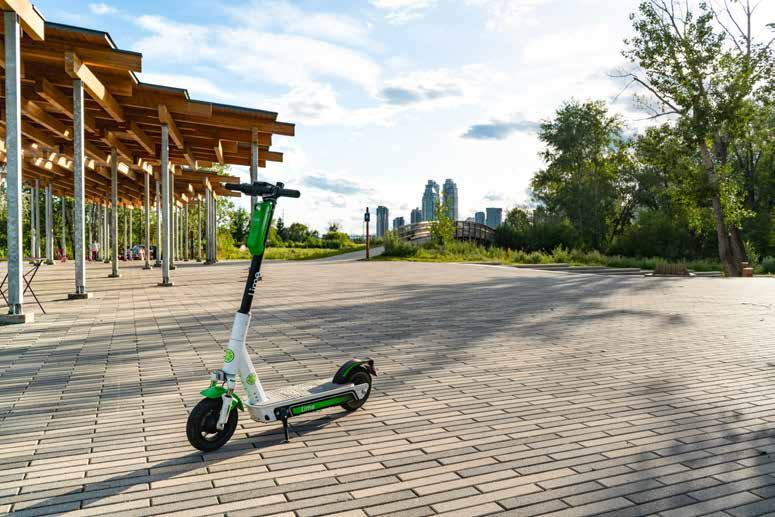
4 minute read
E-Scooters are a nice alternative to the Better Way during Pandemic times.
STUART HIMMEL
Staff Writer
Advertisement
The Birds, Limes and Rolls made their way to Ottawa in the middle of July. What, you may ask are Birds, Limes and Rolls?
They are names of three E-Scooter companies engaged in head to head survival contest to determine which if any, will be invited back next year. The city’s downtown was filled with electronic scooters carting people from the shops of the ByWard Market to the restaurants of Elgin St to the grounds of Parliament Hill. It was the start of a three and a half month test of the viability and safety of the trendy devices.
Although the final assessment has yet to completed, the project appears to have been a success both anecdotally and numerically. The number of rides taken on e-scooters in Ottawa exceeded expectations while the complaints were few and far between. City Councilor Tim Tierney, who chairs the municipal transportation committee, claimed “there has been a lot of thought put into this and it’s probably been one of the more successful pilot scooter projects across the country if not throughout North America”.
Bird and Lime were each permitted to deploy 260 of the rechargeable scooters while Roll was allowed 80. Over the course of the project, more than 200,000 rides were taken by more than 50,000 individual riders. The vehicles are aimed at several demographics from tourists to students to commuters travelling the last mile from the transit station to their office towers.
The concept is simple. Hop on any scooter where it is found, set it in motion with a smartphone app, then leave it at your destination for the next rider’s use. The average price of a trip is $2-$5.00.
When scooters reach their boundaries or areas deemed off limits (preset by city and company), they automatically shut off. At the end of each day, they are picked up, recharged and set back in the most accessible locations.
Stewart Lyons, the CEO of Bird Canada stated that “We want people
to look at us as a viable transportation option, something they can use for commuting not just as a toy”. “You’ve got to show the municipal politicians that you’re serious about being responsible and we’ve done that in Calgary, Edmonton and now Ottawa”. The scooters are also under consideration in Toronto where city council will soon debate their potential deployment.
They are enticing to cities that want to reduce emissions and traffic on downtown streets or to ease parking congestion. In the era of COVID-19, they provide short trip riders with options that may feel safer than public transit (often referred to the better way), taxis or ride share.
With all that is good about the e-scooter project, there are also some concerns. Irresponsible riders drive them on sidewalks where they can cause havoc for pedestrians. Those who are caught doing so in Ottawa pay a $180.00 fine. Sometimes scooters are left in places where they impede foot traffic and wheelchairs. Officially they may be parked only in what is known as the “furniture zone”, which is the area of sidewalk closest to the street or where benches and bike racks are located. But out of more than 200,000 rides in Ottawa between July and October, there were slightly more than 150 complaints about inappropriate parked scooters and the city responded to them immediately. Clients who park improperly can have their accounts terminated.
Lyons responded with “If you’re trying to be a responsible member of a community, you go the extra effort. We want to have a long term relationship with the city. We don’t want to be a one and done organization”.
There are also safety issues that must be addresses as well. The scooters don’t come with helmets so customers are expected to provide their own. A handful of injuries were reported in Ottawa and all were minor. In areas with higher pedestrian traffic, the scooter automatically has the speed ratchet down to 8 km/h from their maximum of 21 km/h.
John Borstein, owner of five Ottawa restaurants was among a number of business owners to endorse the project in a letter to city council. He said “they are fun for tourists and really great for scooting around and seeing the sights. As a form of transportation, it’s useful for getting around downtown short distances.
Kathleen Wilker, a transportation project officer with the city of Ottawa, says the project which ended on Oct. 31st is now in its final stages with a survey to be completed in November to assess whether it has been a success or failure. City councilor Tim Tierney said “Let’s face it, Ottawa doesn’t have a super cool factor like Toronto or Montreal, but this is one of those things that gives us a bit of cool”.











